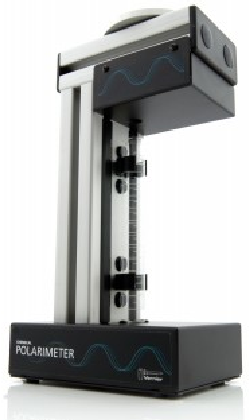Vernier Debuts New Equipment for Science Labs

Vernier's Polarimeter features adjustable and fixed polarizers and an LED for measuring the chiral properties of various substances without altering them chemically. |
Vernier, a company that creates and sells interfaces, sensors, and software for scientific data collection, has rolled out four new lab devices designed to aid students with experiments in chemistry or physics.
The new devices include a projectile launcher, a polarizer/analyzer set, a constant current system, and a chemical polarimeter.
To aid with physics experiments in two dimensional kinematics, the projectile launcher, a pneumatic system with a maximum launch distance of two meters, shoots steel balls at angles ranging between 0 degrees and 70 degrees.
A photogate and angle markings are integrated into the device to allow the measurement of projectile velocity.
Additional features include:
- An adjustable launch speed that ranges from 0 meters per second to 6 meters per second;
- A launch height of 146 millimeters; and
- An internal photogate interval of 50 millimeters.
The chemical polarimeter combines an adjustable polarizer, a fixed polarizer, and an LED to measure the chiral properties of biological compounds, inorganic substances, and organic substances without chemically modifying them.
The polarimeter can be used to analyze the kinetics of acid-catalyzed hydrolysis and enzyme-catalyzed hydrolysis, asses the purity of a sugar solution, asses the purity of organic and inorganic syntheses, determine enantiometric purity, and study the optical activity of amino acids.
Features include:
- Sensitivity up to OD 2;
- A bidirectional optical encoder with 360 cycles per revolution;
- An encoder resolution of 0.25 degrees;
- Accuracy of ±1 degree; and
- A nominal wavelength of 589 nanometers.
For conducting electrolysis and electroplating experiments, the constant current system uses a built in power supply to provide a level of current that can be adjusted from a minimum of 0 amps to a maximum of 0.6 amps.
Features include:
- A power supply voltage of five Volts;
- A resolution of 0.09 milliampere; and
- A linearity of 0.1 percent.
The polarizer/analyzer set is an expansion for Vernier's Optics Expansion Kit that combines a fixed polarizer, an adjustable analyzer, and an adjustable analyzer for rotary motion sensor with a sensor holder, a rotary motion sensor, and a light sensor from the Optics Expansion Kit to enable the analysis of polarized light.
The fixed polarizer polarizes light linearly while the adjustable analyzer for rotary motion sensor records the angle of the analyzer and the light sensor measures the transmitted light intensity.
The polarizer/analyzer set is currently available for $68, the constant current system is currently available for $49, and the chemical polarimeter can be had for $499. The projectile launcher is expected to ship in February for $289.
Further information is available at vernier.com.
About the Author
Dan Thompson is a freelance writer based in Brea, CA. He can be reached here.